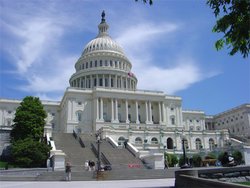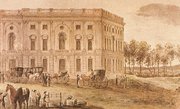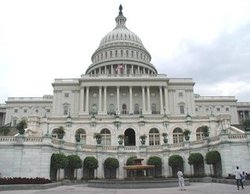United States Capitol
|
|
United_States_Capitol_at_sunset,_2004..JPG
CapitolHillRespectstoReagan.jpg
This is the most common use of Capitol Hill. For other uses, see Capitol Hill (disambiguation).
The United States Capitol is the building which serves as home for the legislative branch of the United States government. It is located atop Capitol Hill in Washington, DC. The building is characterized by a central dome (inspired as much by St Paul's Cathedral, London, as by St. Peter's, Rome) and two wings—one for each branch of Congress. The north wing is home of the Senate and the south wing is home of the House of Representatives.
| Contents |
History of the Capitol Building
The current building is the fourth to serve as the U.S. capitol, after the Maryland State House in Annapolis, Maryland (1783–1784), Federal Hall in New York (1789–1790) and Congress Hall in Philadelphia (1790–1800).
Construction of the current Capitol building began in 1793. The Senate wing was completed in 1800, while the House wing was completed in 1811. The Capitol building held its first session of U.S. Congress on November 17, 1800. Shortly after completion, it was partially burned by the British during the War of 1812. Reconstruction began in 1815, and was completed by 1830. The architect Benjamin Latrobe is principally connected with the original construction and many innovative interior features.
The building was expanded dramatically in the 1850s. The original timber-framed dome of 1818 would no longer be appropriately scaled. Thomas U. Walter was responsible for the wing extensions and the "wedding cake" cast-iron dome, three times the height of the original dome and 30 m in diameter, which had to be supported on the existing masonry piers. Like Mansart's dome at Les Invalides (which he had visited in 1838), Walter's dome is double, with a large oculus in the inner dome, through which one views the Apotheosis of Washington painted on a shell suspended from the supporting ribs, which also support the visible exterior structure and the tholos that supports the Freedom, a colossal statue that was added to the top of the dome in 1863. The weight of the cast-iron for the dome has been published as 8,909,200 lb of iron (4,041,100 kg). For construction details, see links.
When the dome of the Capitol was finally completed, but to a significantly enlarged design than had initially been planned, its massive visual weight overpowered the proportions of the columns of the East Portico, built in 1828. The East Front of the Capitol building was rebuilt in 1904, following a design of the architects Carrère and Hastings, who also designed the Senate and House Office Buildings. An extended addition to the Capitol was constructed in 1958, but the historic Corinthian columns were rendered homeless, until landcape designer Russell Page created a suitable setting for them in a large meadow at the National Arboretum, where they are combined with a reflecting pool in an ensemble that reminds some visitors disconcertingly of Persepolis.
The Rotunda
Apotheosis_of_George_Washington.jpg
Located in the center of the building, topped by the capitol dome, is the Capitol rotunda. At the top of the dome is Constantino Brumidi's fresco, the Apotheosis of Washington. Various people have statues in the rotunda, including Abraham Lincoln and Ulysses Grant. The rotunda of the Capitol is the only place where Americans can lie in state.
The Capitol grounds
The Capitol Grounds cover approximately 274 acres (1.1 km²), with grounds proper consisting mostly of lawns, walkways, streets, drives, and planting areas. Today's grounds were designed by noted American landscape architect Frederick Law Olmsted, who planned the expansion and landscaping performed from 1874 to 1892. In 1875, as one of his first recommendations, Olmsted proposed the construction of the marble terraces on the north, west, and south sides of the building that we see today.
Miscellany
The Capitol houses a variety of works of art, including the National Statuary Hall Collection, which is comprised of statues donated by the fifty states to honor persons notable in their histories.
On July 24, 1998, Russell Eugene Weston Jr. burst into the Capitol and opened fire killing two United States Capitol Police officers. He was later ruled to be incompetent to stand trial.
Currently a multimillion dollar subterranean visitors center is being constructed. Work began in 2001 and it is expected to be completed in 2006.
The Capitol is on the back of the U.S. $50 bill.
Major Events
PayingRespectsToReagan.jpg
The United States Capitol, as well as the grounds of Capitol Hill, have played host to major events. Every year since 1990, people gather on the west lawn on the Sunday before Memorial Day for the National Memorial Day Concert, broadcast on PBS.
Every July 4, people gather on Capitol Hill to celebrate Independence Day.
Among the major events the United States Capitol has hosted:
- Presidential inaugurations
- Americans lying in state. Among them:
- President Ronald Reagan
- Capitol police officers killed in the shooting incident in 1998.
See also
- Architect of the Capitol
- Congressional Subway
- U.S. Capitol shooting incident (1954)
- U.S. Capitol shooting incident (1998)
External links
- Architect of the Capitol Website (http://www.aoc.gov/)
- National Capitol Columns (http://www.usna.usda.gov/Gardens/collections/columns.html)
- Capitol Visitors Center (http://www.aoc.gov/cvc/cvc_overview.htm)
- WashingtonPost.com: Protection vs. 'the People's House' (http://www.washingtonpost.com/wp-srv/national/longterm/shooting/stories/security072598.htm)
- Cupolas of Capitalism Gallery - United States Capitol (1 of 8) (http://www.cupola.com/html/bldgstru/statecap/slide/uscap1e.htm)
- U.S. Senate: Visitors Center Home (http://www.senate.gov/pagelayout/visiting/a_three_sections_with_teasers/visitors_home.htm)
- Temple of Liberty: Building the Capitol for a New Nation (http://www.loc.gov/exhibits/us.capitol/s0.html)
- "Examining the Capitol dome," (http://www.pubs.asce.org/ceonline/1000feat.html) in Civil Engineering Magazine, October 2000
- Arbor Friends, Spring 1999: Take the Tram Tour for a Taste of the Arboretum's Pleasures (http://www.fona.org/members/spring99/tramtour.html)
- Template:Coorde:Kapitol (Washington)
fr:Capitole des États-Unis d'Amérique nl:Capitool (Washington DC) he:הקפיטול pt:Capitólio dos Estados Unidos



